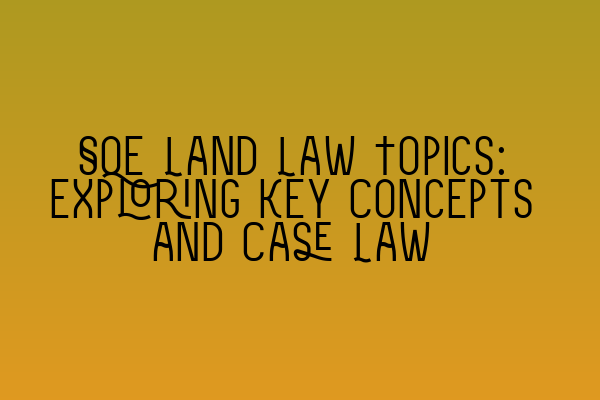SQE Land Law Topics: Exploring Key Concepts and Case Law
At SQE Property Law & Land Law, we understand the importance of having a comprehensive understanding of land law concepts and case law. Whether you’re a solicitor, law student, or aspiring legal professional, having a solid knowledge of land law is crucial in providing effective legal advice and representation to your clients.
In this blog post, we will delve into some of the key concepts within land law and explore relevant case law that helps to shape and interpret these concepts. By the end of this post, you’ll have a clearer understanding of the intricacies of land law and be better equipped to navigate the complex legal landscape.
1. Freehold and Leasehold
A fundamental concept in land law is the distinction between freehold and leasehold interests. Freehold is the absolute ownership of land, while leasehold is a temporary right to use and occupy land for a specified period. Understanding the differences between these two types of land ownership is crucial in advising clients on various legal matters, such as property transactions, lease agreements, and boundary disputes.
2. Registered and Unregistered Land
In the UK, land may be either registered or unregistered. Registered land is governed by the Land Registration Act 2002 and is subject to a system of registration with the Land Registry. On the other hand, unregistered land does not have an official record of ownership, and ownership is typically proved through historical deeds and documents. It is important to be familiar with the requirements and implications of dealing with both registered and unregistered land to provide accurate legal advice to clients.
3. Easements and Covenants
Easements and covenants are legal rights and obligations that may affect the use and enjoyment of land. Easements are rights granted to one party over another’s land, such as a right of way or a right to access utilities. Covenants, on the other hand, are obligations or restrictions placed on the use of land, often arising from deed provisions or contractual agreements. Familiarizing yourself with the principles and case law surrounding easements and covenants is essential in resolving disputes and negotiating property transactions.
4. Adverse Possession
Adverse possession is a legal doctrine that allows a person to become the lawful owner of land by occupying it for a specified period without the owner’s permission. This concept raises various legal and ethical considerations and has been the subject of significant case law development. Understanding the requirements and conditions for establishing adverse possession is crucial in providing advice on boundary disputes and adverse possession claims.
To develop a deeper understanding of these concepts and their practical application, we recommend exploring our related articles:
– SQE 1 Practice Exam Questions: Test your knowledge with practice exam questions related to land law topics.
– SQE 1 Practice Mocks FLK1 FLK2: Further enhance your understanding with practice mocks specifically tailored to land law topics.
– SQE 2 Preparation Courses: Take advantage of our comprehensive SQE 2 preparation courses to deepen your knowledge of land law and other relevant topics.
– SQE 1 Preparation Courses: Lay a strong foundation by enrolling in our SQE 1 preparation courses that cover essential land law topics.
– SRA SQE Exam Dates: Stay updated on the upcoming exam dates for the SRA SQE to plan your preparation effectively.
In conclusion, mastering land law concepts and keeping up with relevant case law developments is crucial for any legal professional or aspiring solicitor. By delving into the key concepts mentioned above and exploring related articles, you’ll be well on your way to becoming a knowledgeable and competent property law practitioner.
Remember, at SQE Property Law & Land Law, we are dedicated to providing high-quality legal education and support. If you have any questions or require further assistance, do not hesitate to reach out to our expert team.
